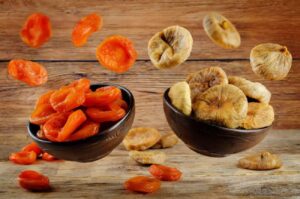Discovering the Wonders of Dried Fruits: Learning about Dried Figs, Apricots, Mulberries, and More
Let's take a closer look at dried fruits, like figs, apricots, and mulberries, to uncover their amazing qualities. We will explore their sweetness, unique flavors, and how they can be used in different ways. Join us in unraveling the secrets behind these dried fruits and their fascinating history. From being natural preservatives to delicious snacks, dried fruits have a lot to offer, and we are here to explore it all!
Nutrient Concentration:
Dried Figs and Apricots: Drying removes the water content from fruits, leading to a higher concentration of nutrients. Dried figs, for instance, become a rich source of dietary fiber, vitamins (such as vitamin A, vitamin K, and B vitamins), and minerals (including potassium, magnesium, iron, and calcium).
Natural Sweetness:

Dried Figs and Apricots: The drying process intensifies the natural sugars present in the fruits, resulting in a sweet flavor. This sweetness makes dried figs and dried apricots popular as natural sweeteners in recipes, and they can be enjoyed as a healthier alternative to candies or processed sweets.
Long Shelf Life:
Drying is an ancient preservation technique that extends the shelf life of fruits. By removing water, the growth of bacteria, yeast, and molds is inhibited. This allows dried figs, apricots, mulberries, and chips made from persimmons and figs to be stored for months without spoilage.
Fiber Boost:
Dried Mulberries, Figs, and Apricots: These dried fruits are excellent sources of dietary fiber. Fiber aids in digestion, promotes a feeling of fullness, and helps regulate blood sugar levels. Consuming these dried fruits can contribute to a healthy digestive system.
High-Energy Snack:
Dried Fig Chips and Dried Persimmon Chips: The dehydration process makes these snacks lightweight and energy-dense. They are convenient for carrying on hikes, workouts, or as a quick pick-me-up during a busy day. The natural sugars in dried fruits provide a rapid source of energy.
Super Protector Against Harmful Stuff:
Dried Mulberries: Mulberries, even when dried, retain their antioxidant properties. Antioxidants help neutralize free radicals in the body, potentially reducing the risk of chronic diseases and supporting overall health.
Flexible in Cooking:

Dried Figs and Apricots: Beyond snacking, these dried fruits can be incorporated into a variety of dishes. They add natural sweetness to salads, oatmeal, yogurt, and desserts. Dried figs can also be stuffed with nuts or cheese for a savory-sweet treat.
Natural Preservatives:
Drying Process: Drying acts as a natural preservative. The reduction of water content inhibits the growth of spoilage-causing microorganisms. This method has been employed by various cultures throughout history allowing them to store fruits for times of scarcity.
Rich Tradition:
Historical Significance: Drying fruits has been a practice since ancient times. In regions with sunny climates, sun drying was a common method. The preserved fruits served as essential food stores during periods when fresh produce was scarce.
Medicinal Uses:
Dried Figs: In traditional medicine, dried figs have been used for their potential health benefits. They are believed to aid in digestive issues, such as constipation, and may have respiratory benefits. However, it's crucial to note that these uses should be approached with caution and may not replace professional medical advice.
Incorporating a variety of dried fruits into your diet can be a flavorful and nutritious way to enjoy their unique qualities while benefiting from the concentrated nutrients they offer. As with any food, moderation is key to a balanced and healthy lifestyle.
Are you excited to taste the goodness of dried fruits and enjoy all the incredible benefits we have uncovered in this article? Why wait? Treat yourself today! Visit our online store Deliciomo foods and take the first step towards a healthier, happier you. Click the link and to buy.






